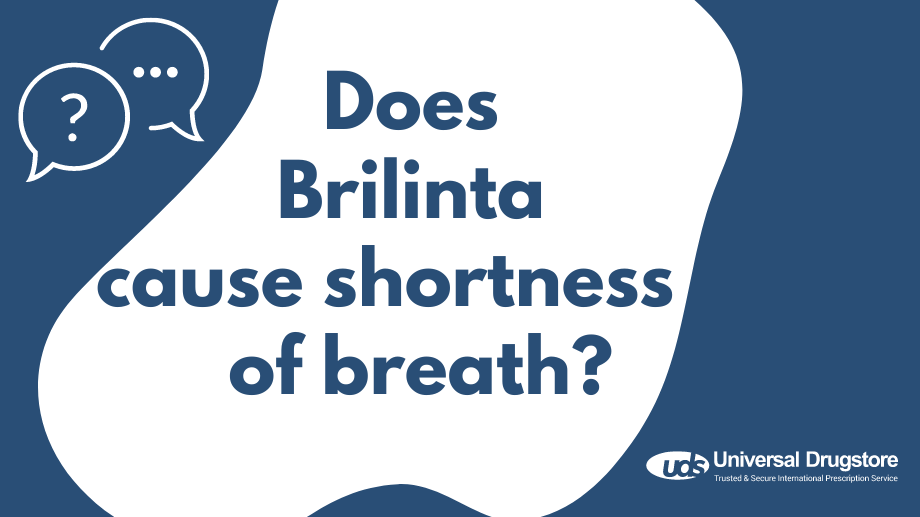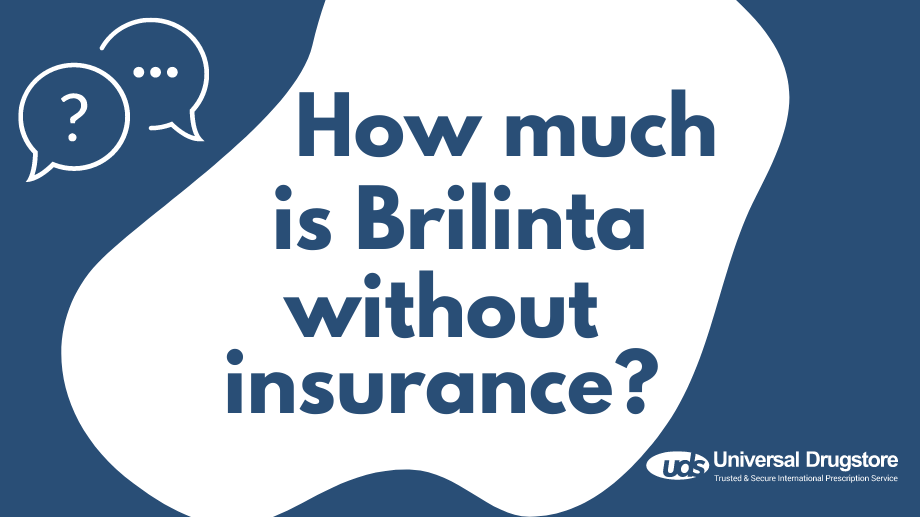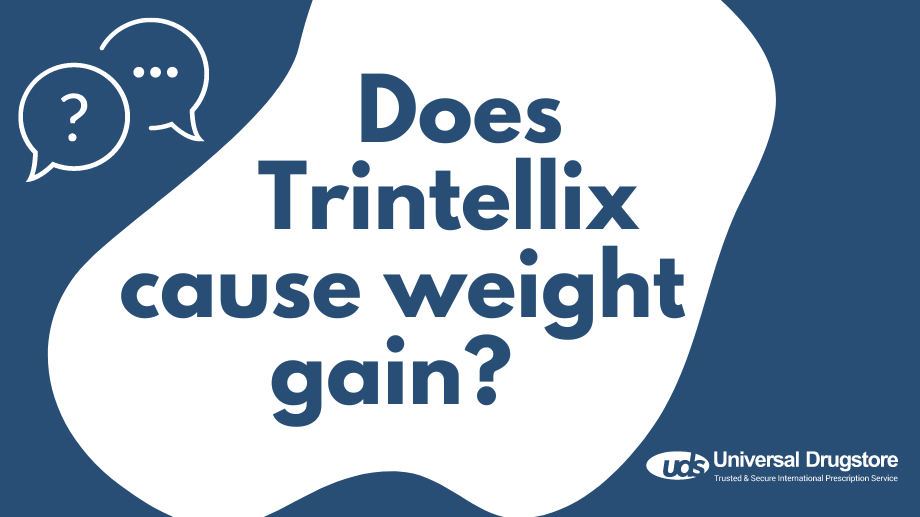Dyspnea is defined as difficult, painful breathing or shortness of breath. It can feel like your chest is tight or you can not get enough air into your lungs. It is often a sign of lung and heart conditions. Shortness of breath is also a side effect of some medications and illegal drugs. It is the most common side effect of Brilinta and can lead to drug discontinuation in almost 1 in every 20 patients. Shortness of breath from Brilinta can cause fear, panic, and anxiety because it can also be a sign of a more serious complication such as acute coronary syndrome or impending heart attack. It typically will go away within a few minutes but can keep coming back over the course of hours to days.
You should notify your healthcare provider immediately if you experience shortness of breath that worsens or does not get any better. They can determine the cause and may need to switch you to a different antiplatelet drug.
Brilinta FAQs
What does Brilinta treat?
Brilinta (ticagrelor) is a platelet inhibitor that is manufactured by AstraZeneca. It is approved by the U.S. Food and Drug Administration (FDA) to:
-
Lower your risk of heart attack (myocardial infarction), stroke, and death with acute coronary syndrome (ACS), severe chest pain, or a previous heart attack
-
Lower your risk of blood clots following a stent in blood vessels in your heart
-
Lower your risk of a first heart attack or stroke from coronary artery disease (CAD) if you are at a higher risk for these events
-
Lower your risk of stroke from certain conditions such as acute ischemic stroke or transient ischemic attack (TIA)
How does Brilinta work?
Brilinta stops platelets from sticking together to form blood clots in your blood vessels, which can cause serious complications if left untreated. It helps increase blood flow to your heart and reduces the risk of stroke and heart attack.
Is shortness of breath a common side effect of Brilinta?
Yes, shortness of breath is the most common possible side effect seen in clinical trials with Brilinta. Some other adverse effects included:
-
Increased risk of bleeding, including nosebleeds
-
Diarrhea
-
Dizziness
-
Nausea
Brilinta can sometimes cause serious side effects such as:
-
Severe, life-threatening allergic reactions, including anaphylaxis (hives, swelling of your tongue or throat, and shortness of breath)
-
Increased risk of serious bleeding that requires immediate medical attention, especially if you are taking other anticoagulants or blood thinners
-
Slow heart rate and heart rhythm problems
-
Liver damage
These are not all of the possible side effects of Brilinta. You should always seek medical advice from your healthcare professional for any questions or concerns about your medical condition or treatment. Read all medication guides, prescribing information, or drug information sheets that come with this medication. You can report side effects to FDA at 1-800-FDA-1088 or www.fda.gov/medwatch.
Why does Brilinta cause shortness of breath?
The exact reason why Brilinta causes shortness of breath is not known. The are 2 main theories that may explain why. The first states that increased levels of adenosine may cause trouble breathing. Brilinta blocks the clearance of adenosine so there is a higher level of it in the bloodstream. While adenosine does not cause bronchospasm, it does affect nerve fibers in the airways. This can lead to coughing, chest tightness, and trouble breathing, as well as bronchoconstriction (closing of the airways). However, dipyridamole is a medication that inhibits adenosine clearance more than Brilinta and does not cause shortness of breath, so this theory may not be correct.
The second theory is related to the blocking of P2Y12 receptors by Brilinta that are found on platelets and other cells in your central nervous system. Blocking these receptors stimulates a system that affects breathing which can lead to Cheyne-Stokes respirations, a rare abnormal breathing pattern.
How often does Brilinta cause shortness of breath?
In clinical trials, the incidence of shortness of breath in people taking Brilinta was 14% to 21%. While it is typically mild and does not last long, it can troublesome. It should be noted that this side effect does not cause any damage to your lungs.
Since Brilinta has been on the market there have been reports of central sleep apnea (CSA). CSA is a disorder in which your breathing repeatedly stops and starts while you sleep. It is not known how often this happens in people taking Brilinta.
Does shortness of breath go away with Brilinta?
Repeated shortness of breath episodes occurred in up to 21% of people taking Brilinta in clinical trials. These episodes are usually mild and will go away within a few hours or days. It generally occurs in the first week of starting this medication. Most people taking Brilinta will not need to stop this medication because of this side effect. Your doctor should monitor you for at least 3 to 4 days without stopping Brilinta, as the attack will typically disappear within that time. However, if you have trouble breathing at any point while taking Brilinta, call your doctor to see if a change in medication is needed.
How long does shortness of breath last with Brilinta?
In most cases, Brilinta-related shortness of breath starts about 2 hours after taking the drug. It will appear suddenly, last 1 to 2 minutes, and then disappear on its own. There is usually no cough with an episode of shortness of breath and it is not related to your body position (laying down or sitting up). Between episodes you are asymptomatic, however, shortness of breath due to another reason like heart failure or bronchitis is possible. These episodes generally occur within the first week of treatment with Brilinta.
Are there any drug interactions with Brilinta?
When Brilinta is taken with other drugs, it can change how Brilinta works or make some side effects more likely or severe. You should ask your healthcare provider if any of the prescription drugs, over-the-counter (OTC) drugs, vitamins, or supplements you take may interact with Brilinta, including:
-
Lovastatin
-
Simvastatin
-
Voriconazole
-
Ketoconazole
-
Itraconazole
-
Phenytoin
-
Phenobarbital
-
Carbamazepine
-
Ritonavir
-
Atazanavir
-
Clarithromycin
-
Warfarin
-
Clopidogrel
-
Naproxen
-
Ibuprofen
-
Digoxin
-
Nefazodone
-
Rifampin
Who should not take Brilinta?
Brilinta should not be taken if you have a history of bleeding inside your skull (intracranial hemorrhage), are actively bleeding, or have a known hypersensitivity to ticagrelor or any inactive ingredient in the product. You should not start Brilinta treatment if you are having coronary artery bypass graft surgery (CABG). Once you are taking Brilinta, you should not stop it without discussing it with your doctor. Stopping this medication may increase your risk of serious cardiovascular events, including stroke and heart attack.
What should you tell your doctor before starting Brilinta?
Before starting Brilinta, be sure your healthcare provider is aware of all your medical conditions, including:
-
An active bleed or signs of severe bleeding such as black stools, red, pink, or brown urine, or coughing up blood or vomit that looks like coffee grounds
-
Heart disease, heart failure, high blood pressure, or other heart problems
-
Lung problems including asthma and chronic obstructive pulmonary disease (COPD)
-
Liver problems
-
You are taking more than 100 mg of aspirin per day
-
Are pregnant, plan on becoming pregnant, or are breastfeeding
How do you take Brilinta?
Your dosage and treatment duration for Brilinta will depend on several factors including the medical condition being treated and your response to the medication.
If you are being treated for an ischemic stroke, you will begin with a 180 mg loading dose of Brilinta and then take 90 mg of Brilinta twice a day for up to 30 days.
If you have a history of ACS or heart attack, you will begin with a 180 mg loading dose of Brilinta. Then for the first year, you will take 90 mg twice a day. After a year, you will then start 60 mg of Brilinta 2 times a day.
If you have CAD with no previous heart attack or stroke, you will take Brilinta 60 mg twice a day.
You will also take a 75 mg to 100 mg dose of aspirin daily along with Brilinta to treat these conditions.
Related medications
Sources
-
Brilinta Package Insert: https://den8dhaj6zs0e.cloudfront.net/50fd68b9-106b-4550-b5d0-12b045f8b184/565ceafd-fbe3-4573-9c39-19280af566ec/565ceafd-fbe3-4573-9c39-19280af566ec_viewable_rendition__v.pdf
-
National Library of Medicine: https://www.ncbi.nlm.nih.gov/pmc/articles/PMC4657388/
-
National Library of Medicine: https://www.ncbi.nlm.nih.gov/pmc/articles/PMC7550933/
-
Medscape: https://reference.medscape.com/drug/brilinta-ticagrelor-999674
-
AHA Journals: https://www.ahajournals.org/doi/10.1161/CIRCULATIONAHA.118.034489









